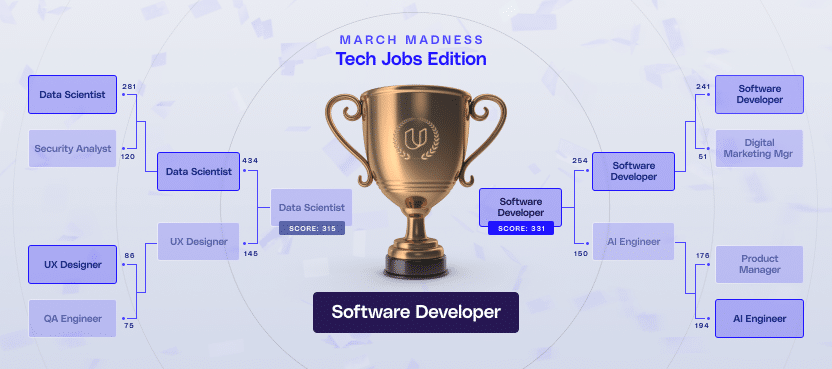The results of March Madness Tech Jobs Edition, and what they say about the state of the tech industry.
Table of Contents
The Competing Roles & What Value They Bring To Teams
The Results
What These Results Say About The State of The Tech Industry
Every Job In Tech Has A Pivotal Role To Play
Just like the excitement of March Madness, the world of technology is an exhilarating game of its own – one filled with fierce competition, top talent, and big ambition. Over the past few weeks, we ran our own March Madness bracket to determine which role deserves to be called tech’s Most Valuable Player. We tapped into our LinkedIn audience by asking them to cast their votes in a series of polls, which pitted eight roles against each other through three rounds – the Elite 8, Final Four, and the Championship.
The vetting was difficult, the matchups were heated, and the results…well, those shed some interesting light on which tech positions play the most important role on high-functioning teams. Let’s recap the path to crowning the MVP and dive into what these outcomes signal about today’s technology landscape.
The Competing Roles & What Value They Bring To Teams
- Data Scientist: Data scientists extract insights and trends from structured and unstructured data sources to inform business decisions through statistical analysis and machine learning models.
- Security Analyst: A security analyst’s role is to monitor networks and systems for security breaches, conduct risk assessments, and develop strategies to protect an organization’s data and infrastructure.
- QA Engineer: Quality assurance engineers meticulously test software for defects, usability issues, and compliance with requirements throughout the development lifecycle.
- Digital Marketing Manager: Digital marketing managers develop strategies to promote brands and acquire customers online through channels like search, social media, email, and blog posts.
- Software Developer: Software developers design, code, test, implement, and maintain software applications and systems based on user requirements.
- AI Engineer: AI engineers research, build, and deploy artificial intelligence models, neural networks, and machine learning systems to enable automated decision-making.
- UX Designer: User experience designers focus on optimizing product usability by conducting research to understand user needs and creating intuitive interfaces.
- Product Manager: Product managers own the strategy, roadmap, and feature definition for a specific product or product line based on market research and revenue goals.
The Results

The Elite 8 saw data scientists dominate security analysts 281-120. UX designers scraped by QA engineers 86-75. Software developers blew out digital marketing managers in a lopsided 241-51 victory. AI engineers edged out product managers 194-176. The Final Four featured data scientists overpowering UX designers 434-145, while software developers took down AI engineers 254-150. In the Championship, software developers narrowly edged out data scientists 280-276 to claim the title.
What These Results Say About The State of The Tech Industry
AI Engineers Are Gaining Steam (But Not As Fast As You Might Think)
Despite all the (understandable) talk around the field of artificial intelligence, software developers beat AI engineers in their matchup handily with a score of 254 to 150. This may come as a surprise to some, given the widespread hype surrounding AI in recent years, which has been palpable across the collective consciousness as well as the boardroom. In fact, Udacity instructor and 25-year AI/ML consultant Dr. Ed Wiley recently noted that number of professionals with the title ‘chief AI officer’ has grown over 500% since June 2023. However, upon closer examination, these findings align with the fundamental role developers play in driving technological advancements across various domains, including AI itself.
Software engineers are the architects and builders of the digital infrastructure that underpins our modern world. From developing operating systems and applications to creating complex software systems and platforms, their contributions are essential to the functioning of virtually every industry and sector. While AI engineers focus specifically on developing intelligent systems and algorithms, their work heavily relies on the tools, frameworks, and platforms created by software engineers. Moreover, software engineering principles and practices are at the core of developing robust, scalable, and maintainable AI systems.
From humble beginnings in various garages across Silicon Valley to today, software developers seem to still hold their place as the true backbone of tech. As such, the recognition of software engineers as the MVP of tech highlights the indispensable nature of their craft in enabling progress across tech, including the remarkable advancements in AI.
Data Scientists & Software Developers in a Dead Heat
The Championship Round was a matchup for the ages, with Udacity audiences decidedly split down to the final minute. In fact, four days into the competition, the poll results were identical!

In the end though, the scales were tipped in favor of software developers, who gained a 51% to 49% advantage over data scientists. This says a few things about the tech industry. For one, although all roles are undoubtedly important, these two seem to be the all stars within your starting lineup. However you slice it, in technology, before you can build an avid base of customers or brand authority, you need 1.) an effective way to draw insights from data, and 2.) a way to build products based on those learnings. Sure, in the short term, there are ways to ride the wave of a creative ad campaign that catches the internet’s attention or have inflated revenue numbers thanks to one or two talented sales leaders in your org, but at the end of the day, your company will only go as far as these winning roles take you.
The career outlook for these positions largely tells the same story. In fact, the U.S. Bureau of Labor Statistics predicts that employment in software development will grow by 31% in the coming decade. This means employers will create more than 10,000 new jobs for software developers.
The employment outlook for data scientists is even more promising. According to the U.S. Bureau of Labor Statistics, employment of data scientists is projected to grow by 35% from 2022 to 2032, much faster than the average for all other occupations. Approximately 17,700 openings for data scientists are projected each year, on average, over the next decade. Clive Humby, the acclaimed entrepreneur behind Tesco’s Clubcard, puts the importance of data in today’s world together nicely: “Data is the new oil. It’s valuable, but if unrefined it cannot really be used. It has to be changed into gas, plastic, chemicals, etc. to create a valuable entity that drives profitable activity; so data must be broken down, and analyzed for it to have value.”
Biggest Blowout: In Tech, Product Reigns Supreme
As a digital marketer myself, I’d be remiss if I didn’t mention how humbling of an experience it was seeing the massive blowout win in the first round by software developers against digital marketing managers (241 to 51…ouch). That said, this is a valuable lesson for those both on the product side and the sales/marketing side of the business: inside and across the tech industry, the product will always reign supreme. Without a robust, innovative, and well-engineered product, even the most exceptional marketing efforts will fall flat.
In other industries, like consumer packaged goods (CPG) or retail, this isn’t necessarily the case. With more static products, such as Coke and Pepsi, the product has stayed relatively consistent over the years, and finding fresh ways to market it is the name of the game. However, in the rapidly evolving tech landscape, where startups and tech giants alike fight to scrape and claw their way into the minds of consumers, the product needs to be there first before the marketing team can effectively sell it.
This notion is further reinforced by industry data on marketing spend. According to Statista’s 2023 report, the tech/software industry allocates only 11.8% of its budget to marketing efforts, relatively lower than CPG (25.19%), retail/wholesale (14.52%), communications/media (14.27%), and even pharma/biotech (12.83%). This disparity highlights the tech industry’s continued emphasis on prioritizing product development and engineering over marketing.
Every Job In Tech Has A Pivotal Role To Play
While our March Madness bracket may have crowned one tech role as the MVP, the true takeaway is that every position on a tech team plays a crucial part in achieving success – just like how every basketball position from point guard to center is vital for a championship run. A data scientist’s ability to extract insights from data is meaningless without the security analyst fortifying systems and the QA engineers ensuring software quality. Digital marketing managers may drive brand awareness, but it’s the UX designers who craft intuitive user experiences that convert leads into paying customers. AI engineers pushing the boundaries of machine learning rely on software developers to build robust applications. And overseeing it all are the product managers defining the strategic roadmap informed by market research.
Tech, like basketball, is a finely-tuned ensemble where the collaboration of wide-ranging roles and specialists is what ultimately wins the game. While we had fun hyping the MVP, the real champions are the well-rounded tech teams where complementary talents coalesce into innovative products and solutions that shape our future. Ready to forge your future in tech? Visit Udacity.com to see how you can become your team’s Most Valuable Player.



